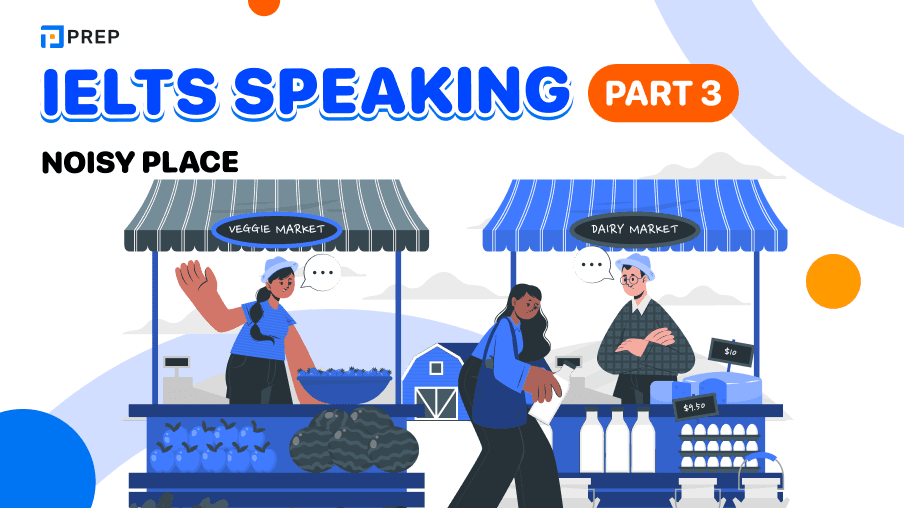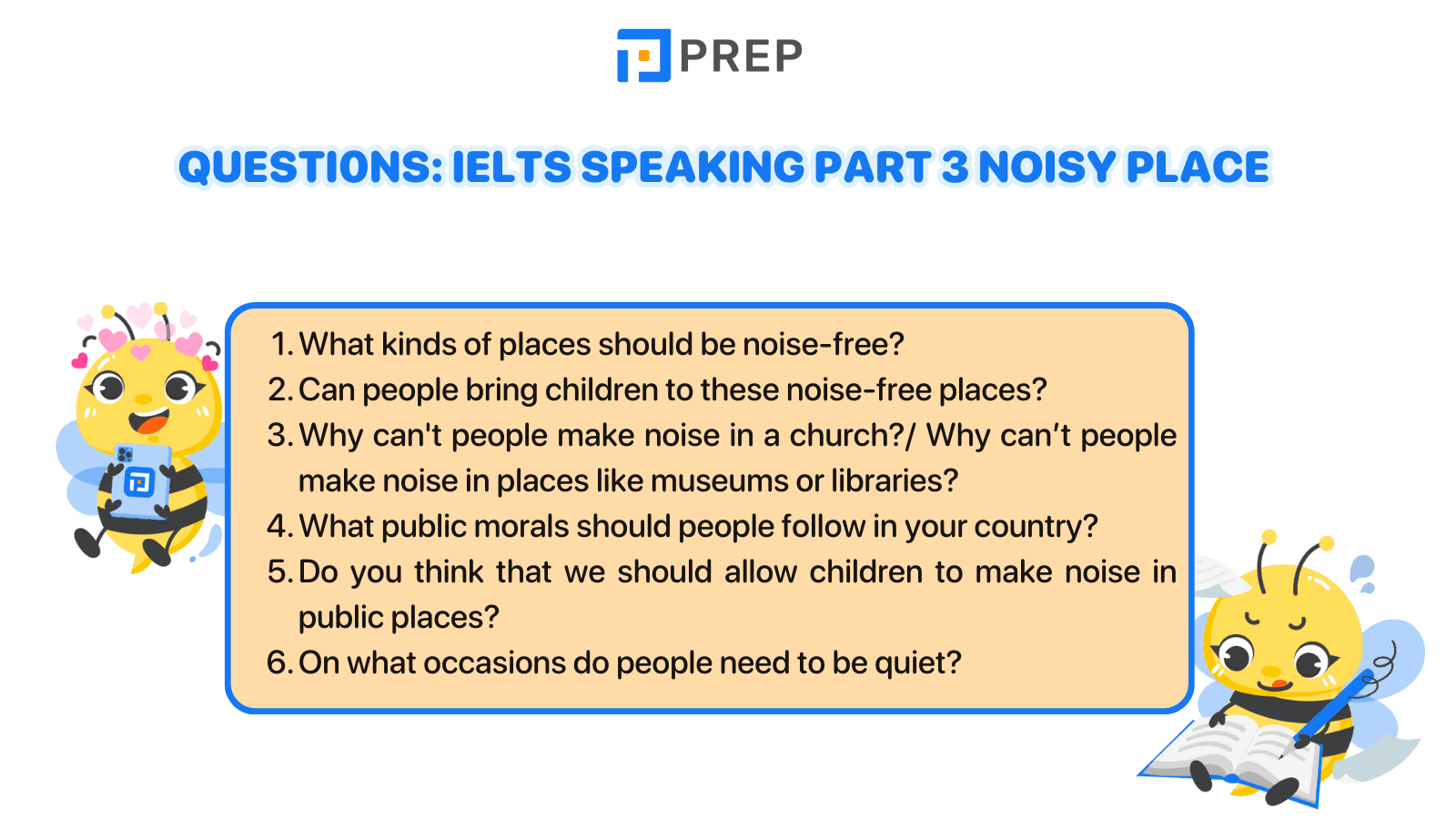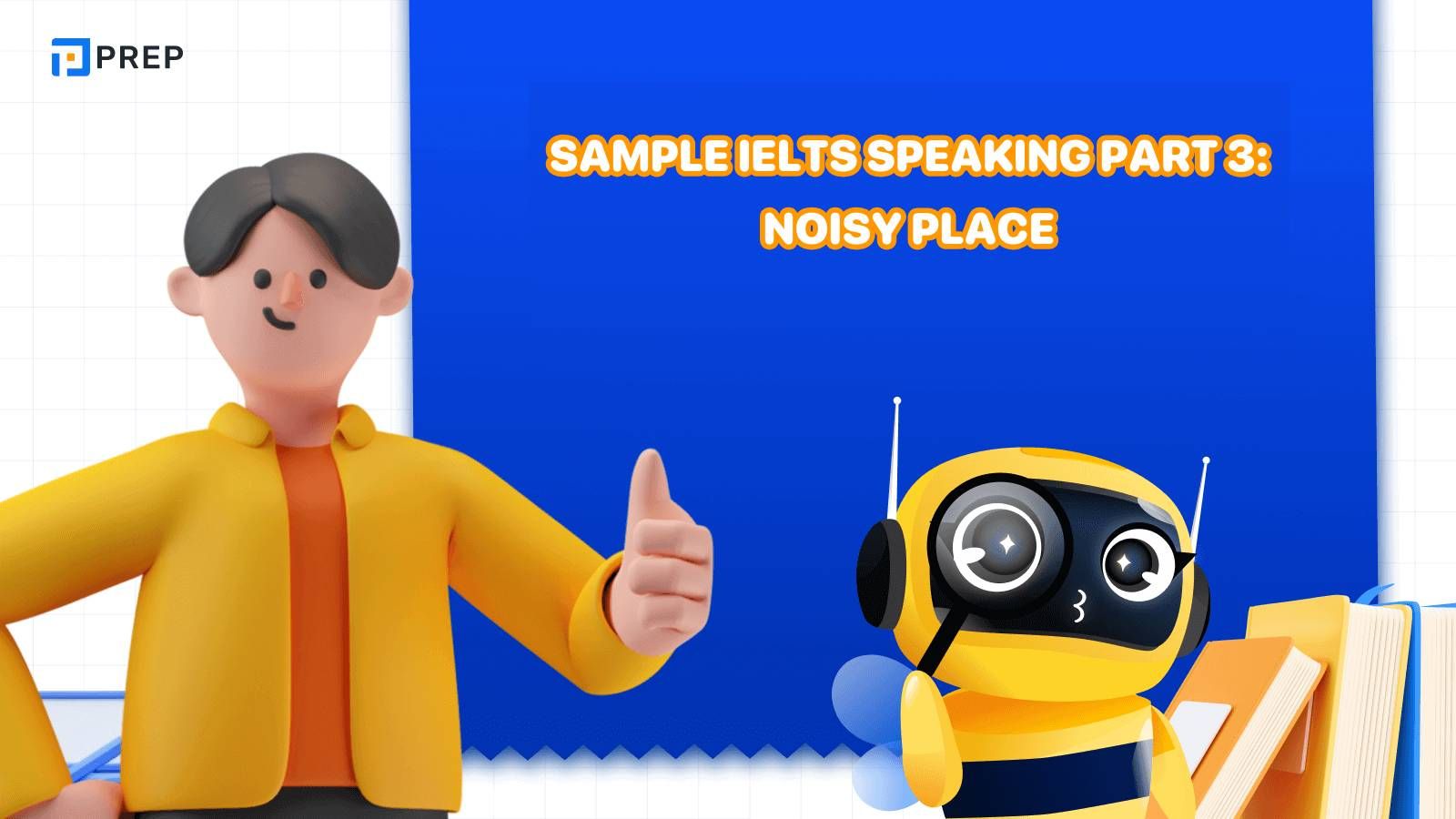IELTS Speaking Part 3 Noisy place
The topic of "Noisy Place" frequently appears in the IELTS Speaking Part 3 test. In this article, let's explore together with PREP the list of questions, sample answers, and commonly used vocabulary in IELTS Speaking Part 3 Noisy Place.
*This sample was prepared by Mr. Nhat Pham, an IELTS 8.5 Overall achiever (9.0 Listening, 9.0 Reading, 8.0 Writing, 7.5 Speaking) and Marker Leader at PREP.
- I. IELTS Speaking Part 3 questions with answers on Noisy Place
- II. IELTS Speaking Part 3 topics with answers related to Noisy Place
- 1. What kinds of places should be noise-free?
- 2. Can people bring children to these noise-free places?
- 3. Why can't people make noise in a church?/ Why can’t people make noise in places like museums or libraries?
- 4. What public morals should people follow in your country?
- 5. Do you think that we should allow children to make noise in public places?
- 6. On what occasions do people need to be quiet?

I. IELTS Speaking Part 3 questions with answers on Noisy Place
Here, PREP would like to share a list of common questions on IELTS Speaking Part 3 Noisy Place:
-
What kinds of places should be noise-free?
-
Can people bring children to these noise-free places?
-
Why can't people make noise in a church?/ Why can’t people make noise in places like museums or libraries?
-
What public morals should people follow in your country?
-
Do you think that we should allow children to make noise in public places?
-
On what occasions do people need to be quiet?

II. IELTS Speaking Part 3 topics with answers related to Noisy Place

Let's quickly explore the IELTS Speaking Part 3 sample answer related to Noisy Place:
1. What kinds of places should be noise-free?
The place I think of first is libraries. These are spaces for reading, studying, and concentration. Maintaining a noise-free or quiet atmosphere is essential to allow patrons to focus on their work or reading materials. Moreover, churches, temples, mosques, and meditation centers should provide a serene and noise-free environment to facilitate prayer, meditation, and reflection. All in all, it's essential to strike a balance between noise-free spaces and those that allow for social interaction and communication. Noise regulations and policies can help maintain appropriate noise levels in these environments.
Vocabulary commonly used in IELTS Speaking Part 3 examples related to Noisy Place:
-
Concentration (n): The act of focusing one's attention or mental effort
-
Patrons (n): Customers or supporters of an establishment or cause
-
Serene (adj): Calm, peaceful, and untroubled
-
Strike a balance between (v): To achieve a balance or compromise between two things
-
Maintain (v): To keep in good condition; to continue in a specified state
2. Can people bring children to these noise-free places?
While many noise-free places are intended to maintain a peaceful and quiet environment, the acceptability of bringing children to these places can vary depending on the specific location and its rules or policies. For example, most libraries have designated children's sections or areas where kids can read and study. Parents are encouraged to accompany their children and teach them the importance of keeping noise to a minimum in other library areas. Thus, places of worship generally welcome families and children. Parents should ensure that their children are well-behaved and respectful of the sacred space and the worshippers.
Vocabulary commonly used in IELTS Speaking 3 samples related to Noisy Place:
-
Noise-free (adj): Without any noise or sound
-
Acceptability (n): The quality of being acceptable or suitable
-
Designated (adj): Officially assigned or set apart for a specific purpose
-
Worshippers (n): People who engage in worship or religious devotion
3. Why can't people make noise in a church?/ Why can’t people make noise in places like museums or libraries?
The expectation of maintaining a quiet and reverent atmosphere in a church is rooted in religious and cultural traditions. Churches are places of worship and are considered sacred by many religious denominations. Silence is seen as a way to show reverence and respect for the presence of the divine or the sanctity of the space. Moreover, many individuals visit churches for prayer, meditation, and reflection. Silence allows them to focus on their spiritual connection, seek solace, and engage in meaningful communion with their beliefs. It’s not a full list of all the reasons but they are the main ones.
Vocabulary commonly used in IELTS Speaking Part 3 Noisy Place:
-
Reverent (adj): Showing deep respect and admiration
-
Denominations (n): Different religious groups or sects within a religion
-
Reverence (n): A deep respect and awe, often for something sacred
-
Spiritual (adj): Relating to or affecting the human spirit or soul, rather than material or physical things
4. What public morals should people follow in your country?
Societal norms can vary from one country to another, and they can change over time. Generally speaking, showing respect to older individuals is highly valued in Vietnamese culture. This includes using appropriate forms of address and practicing deference in interactions. Moreover, Vietnamese people are known for their hospitality and welcoming nature. Offering guests food and beverages, even in casual settings, is a common practice. An interesting fact is that while punctuality is important in professional settings, social gatherings and meetings with friends can sometimes have a more relaxed approach to time.
What is considered morally acceptable can also be influenced by personal beliefs and societal changes so it's advisable for visitors to respect and observe local customs and values when in Vietnam or any foreign country.
Vocabulary commonly used in IELTS Speaking Part 3 Noisy Place:
-
Norms (n): Standards of behavior or expected social conventions
-
Deference (n): Polite submission or respect shown towards someone or something
-
Hospitality (n): The friendly and generous reception and entertainment of guests or strangers
-
Beverages (n): Drinks, such as tea, coffee, or alcohol
-
Punctuality (n): The quality of being on time and not late
-
Acceptable (adj): Able to be agreed to; adequate or satisfactory
-
Observe (v): To watch or notice carefully; to conform to or abide by
5. Do you think that we should allow children to make noise in public places?
I think this should be contingent upon each situation or context. While allowing them to be natural and express what they want is crucial, instilling consideration for others is equally important. For example, it's quite free for young folks to roam free and shout their lungs out with their friends in a playground or in a park where they can play on rides or games, etc. But coming into a public area where privacy and respect for others should be kept, like on board of a plane or in an office, parents or responsible adults.
should now let them make too much noise.
Vocabulary commonly used in IELTS Speaking Part 3 Noisy Place:
-
Contingent (adj): Depending on or conditioned by something else
-
Roam (v): To wander or walk about without a specific destination
-
Public area (n): An area or space that is open and accessible to the general public
-
Respect (v): To have due regard for the feelings, wishes, or rights of others
6. On what occasions do people need to be quiet?
Instances requiring silence vary, such as during solemn ceremonies, religious services, or educational settings like libraries. Maintaining quietude is essential for respectful participation and concentration in these environments. While the need for silence is clear, hesitation may surface when individuals grapple with competing priorities, like enforcing discipline in shared spaces without stifling individual expression.
Vocabulary commonly used in IELTS Speaking Part 3 Noisy Place:
-
Ceremonies (n): Formal procedures or rites performed on special occasions
-
Quietude (n): A state of calmness and tranquility
-
Hesitation (n): The act of pausing before saying or doing something
-
Enforcing (v): To compel observance of or compliance with
-
Stifling (adj): Oppressively hot, airless, and uncomfortable
PREP has provided you with a comprehensive set of sample answers for IELTS Speaking Part 3 Noisy Place. Keep following PREP to regularly update your high-quality English knowledge!
PREP – The intelligent learning & exam preparation platform that uses AI not only corrects mistakes in detail like a teacher but also recognizes strengths to encourage learners, enhancing the quality of your speaking to a higher band score while maintaining 100% of your original ideas. When you learn IELTS Speaking at PREP, you don't just need to speak correctly, but speak better and more effectively.
Register HERE to receive advice on your IELTS Speaking learning plan.
Download the PREP app now to self-study IELTS at home with a high-quality online training program that helps you improve every day.

Hi I'm Chloe, and I am currently serving as an Product Content Administrator at Prep Education. With over five years of experience in independent online IELTS study and exam preparation, I am confident in my ability to support learners in achieving their highest possible scores.
Comment
Premium content
View allPersonalized roadmap
Most read












